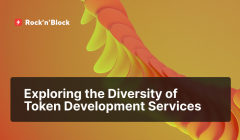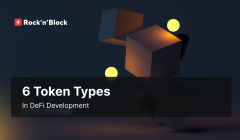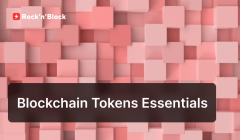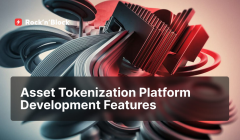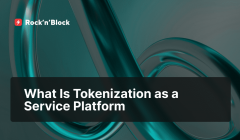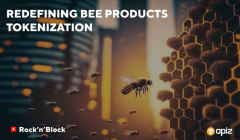The Impact of Asset Tokenization on Modern Economy
03 May 2024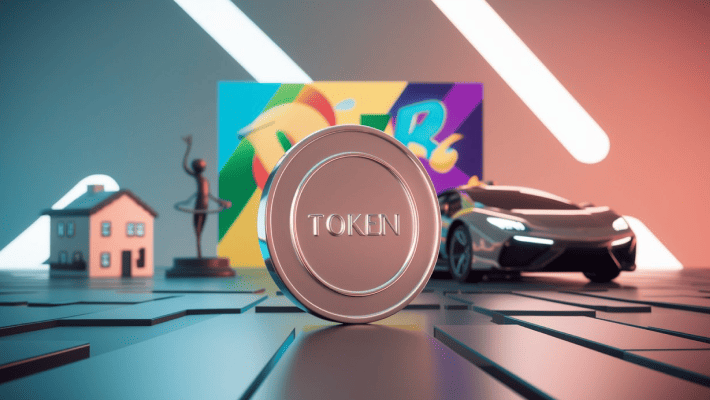 What Is the Need for Tokenization?
What Is the Need for Tokenization?
Asset tokenization is the process of converting real-world assets (RWA) into tokens on a blockchain. This approach addresses several needs in the modern economy. By tokenizing assets and leveraging blockchain technology, asset tokenization opens up new investment opportunities, encourages greater market participation, and promotes a more efficient and inclusive financial ecosystem.
Asset tokenization allows large and high-value assets to be transformed into smaller, more manageable parts represented by blockchain tokens. RWA tokenization divides assets into fractions, enabling fractional ownership and allowing individuals to purchase and trade even small portions of valuable assets. These tokens, securely recorded on a blockchain, serve as cryptographic proofs of ownership, ensuring transparency and security throughout transactions. Asset tokenization revolutionizes the financial landscape by making previously inaccessible assets more attainable and liquid, fostering greater inclusivity and efficiency in investment markets.
What Problem Does Tokenization Solve?
Asset tokenization is a powerful solution to challenges in traditional asset ownership. It addresses the lack of liquidity in certain asset classes, making them more attractive to investors. This process also simplifies managing ownership records and executing transactions, reducing operational costs. Token development is based on blockchain technology, which enhances the security and transparency of asset ownership, mitigating risks such as fraud and unauthorized tampering. RWA tokenization revolutionizes asset ownership by unlocking liquidity, improving efficiency, and bolstering trust in the financial ecosystem.
Why Is Tokenization More Secure?
Tokenization uses the unique characteristics of blockchain technology to provide enhanced security. By recording ownership rights and transaction history on a decentralized ledger, this process ensures immutability and transparency. Each blockchain token represents a cryptographic proof of ownership, securely stored on the blockchain, making it nearly impossible to alter or replicate. Smart contracts embedded within tokenized RWA automate compliance and execution of predefined rules, reducing the risk of human error or fraud. Blockchain's distributed nature eliminates single points of failure, enhancing resilience against cyber attacks. RWA tokenization enhances security by providing immutable records, automated processes, and decentralized infrastructure, thereby instilling trust and confidence in asset ownership.
What Types of Assets May be Tokenized?
The possibilities for asset tokenization are vast and varied. Let's delve into key categories to understand the unique opportunities they offer.
Real Estate
Tokenization allows real estate assets to be divided into smaller, more affordable fractions, enabling investors to participate in lucrative property markets without the need for large capital outlays. This democratization of real estate investment enhances liquidity and accessibility for both investors and property owners.
Institutional
Institutional assets, such as private equity and venture capital, can be tokenized to streamline trading processes, reduce transaction costs, and increase market efficiency. Tokenization offers greater transparency and accessibility to institutional investments, attracting a broader range of investors.
Commodities
Tokenizing commodities like gold, oil, and agro industry products enables fractional ownership and facilitates efficient trading on digital platforms. This enhances liquidity and provides investors with exposure to commodity markets without the logistical challenges of physical ownership.
Intellectual
Intellectual property rights, including patents, copyrights, and trademarks, can be tokenized to enable creators to monetize their innovations directly. Tokenization of intellectual property enhances intellectual asset management, facilitates licensing agreements, and ensures fair compensation for creators.
Carbon Credits
These tokens can be created from initiatives like tree planting, sustainable aviation fuel production, and other environmental activities that aim to reduce carbon emissions. This encourages sustainable practices and enables carbon offsetting transactions, giving environmental initiatives access to global markets.
Financial Securities
Traditional financial securities, such as stocks, bonds, and derivatives, can be tokenized to increase market liquidity, reduce settlement times, and automate compliance processes.
Art & Collectibles
Tokenization allows fractional ownership of art pieces, rare collectibles, and luxury goods, making high-value assets more accessible to a wider audience beyond just affluent collectors.
Physical Property
Beyond real estate, tokenization extends to various physical assets like vehicles, machinery, equipment, and even aviation. Tokenizing physical property allows efficient asset management, fractional ownership, and seamless transfer of ownership, unlocking liquidity and investment opportunities in diverse asset classes.
Entertainment
Tokenization of entertainment assets, including music royalties, film rights, and gaming assets, revolutionizes the entertainment industry by providing creators and investors with new revenue streams and ownership models. This empowers creators to monetize their content and engage directly with their audience, fostering a more equitable and transparent entertainment ecosystem.
What Are the Benefits of Asset Tokenization?
Asset tokenization has emerged as a transformative solution in modern finance, reshaping the way traditional assets are represented and traded. Let’s explore why tokenization is so appealing to stakeholders, highlighting the transformative potential that awaits those who embark on this innovative journey.
Enhanced Liquidity
Enhanced liquidity is crucial for project owners as it allows them to quickly access capital and optimize the financial performance of their assets. Tokenizing assets and making them tradable on secondary markets can attract a broader pool of investors and facilitate faster transactions, improving cash flow management and enhancing the overall valuation and attractiveness of the assets. Enhanced liquidity provides project owners with greater flexibility to respond to market opportunities and challenges, allowing them to execute strategic initiatives more efficiently.
Access to Global Investors
Accessing a global investor base is crucial for attracting diverse funding sources and expanding the reach of projects. Assets tokenization allows project owners to break down geographical barriers and tap into a worldwide network of investors. Access to global investors can foster innovation and scalability, as project owners can leverage international partnerships and market insights to drive growth and expansion. This can accelerate the development of ventures, enhance market visibility, and unlock new opportunities for collaboration and value creation.
Fractional Ownership
Fractional ownership democratizes access to high-value assets, making them more attractive to a wider pool of investors. Assets are tokenized into smaller, tradable fractions, allowing project owners to offer investors the opportunity to participate at a level that suits their budget and preferences. This not only increases the investor base but also diversifies funding sources, reducing reliance on a few large investors. Fractional ownership promotes inclusivity and community engagement among investors, strengthening their commitment to the project's success. It also allows project owners to maximize asset utilization, optimize returns, and mitigate risks.
Cost Efficiency
For project owners, achieving cost efficiency is paramount, and asset tokenization offers a pathway to streamline operations and reduce overhead expenses. By tokenizing assets and leveraging blockchain technology, project owners can eliminate intermediaries and administrative complexities associated with traditional asset management. This reduction in intermediaries not only lowers transaction costs but also minimizes fees associated with brokerage, custody, and settlement services. Additionally, automated compliance mechanisms and smart contract functionalities, are reducing the need for manual intervention and regulatory oversight. This automation not only saves time but also enhances accuracy and transparency, leading to improved operational efficiency.
Dynamic Capital Structuring
Asset tokenization provides project owners with dynamic capital structuring, allowing them to create customized investment instruments that meet specific project needs and investor preferences. This offers unparalleled flexibility in accommodating various risk preferences, return expectations, and liquidity requirements. Asset tokenization enables project owners to access innovative financing solutions, including revenue-participation tokens, profit-sharing agreements, and hybrid investment models, to promote sustainable growth and value creation. Dynamic capital structuring facilitates efficient capital allocation, risk mitigation, and return optimization, enhancing project owners' ability to succeed in competitive markets.
Data-Driven Insights
Tokenization platforms generate valuable data insights that can inform strategic decision-making and asset optimization. By analyzing transactional data and investor behavior on the platform, project owners gain a deeper understanding of market demand, asset performance, and investor preferences. This data-driven approach enables owners to refine their asset strategies, enhance investor engagement, and drive sustainable growth.
Unlocking Network Effects
Asset tokenization platforms can catalyze powerful network effects within the financial ecosystem by digitizing and creating interoperable tokenized assets. This enables seamless connectivity and collaboration among stakeholders. As more assets are tokenized and traded on the platform, network effects amplify, attracting additional investors, liquidity, and opportunities. This cycle improves market efficiency and liquidity, fosters innovation and adoption across diverse asset classes, and creates a thriving ecosystem where assets are seamlessly traded, value is continually created and exchanged, and stakeholders are incentivized to participate and contribute.
Monetization of Intangible Assets
Asset tokenization has revolutionized the monetization of intangible assets by enabling their digitization into blockchain-based tokens. Previously inaccessible assets, such as intellectual property rights, patents, and brand equity, can now be tokenized, allowing project owners to unlock their value in innovative ways. Through tokenization, intangible assets become divisible, tradable, and accessible to a broader investor base. This transformative approach not only facilitates fractional ownership but also fosters liquidity and transparency in the market.
The Future of Asset Tokenization
Asset tokenization has the potential to transform ownership management and democratize investment opportunities. Partnering with reliable asset tokenization companies can unlock numerous benefits and lead your business into a new era of financial innovation and inclusivity. Tokenization opens doors to previously inaccessible asset classes, fosters experimentation and creativity, and democratizes investment opportunities. Work with Rock'n'Block to create a more accessible, liquid, and transparent future of finance. Let's harness the power of tokenization to build a more efficient, resilient, and equitable financial ecosystem together!
We ❤️ Development
Follow us on social media to receive the hottest blockchain development updates
Twitter ⚡️Telegram⚡️LinkedIn⚡️Facebook
